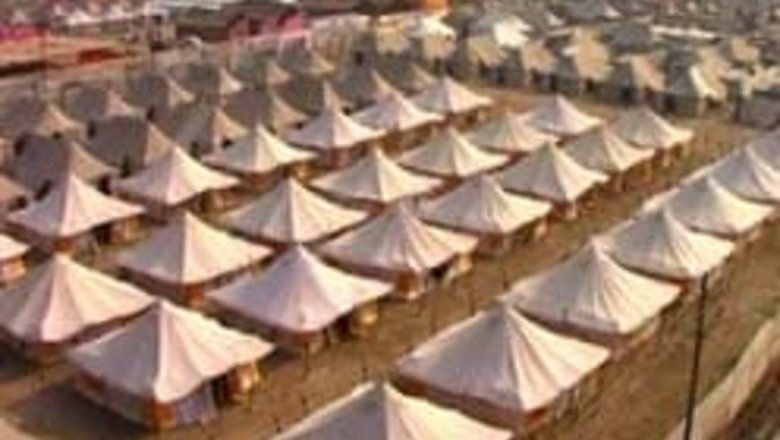
views
Allahabad: Indian movies are replete with stories of people getting lost at the 12-yearly Kumbh Mela - the largest single human gathering on earth. But such incidents often occur in reality, too, when millions converge here for the six-yearly Ardh-Kumbh.
The only difference now perhaps is that unlike the past, most of the 'lost' ones do get reunited with their kin - thanks to the yeoman service being rendered by two voluntary organisations.
"We united about 33,000 lost people - mostly women and children - at the last Maha Kumbh in 2001," says Raja Ram Tiwari, the 80-year-old manager of Bharat Sewa Dal, a voluntary body in this business for 61 years.
At the Ardh Kumbha, millions took a holy dip in the confluence of three rivers - Ganga, Yamuna and the now invisible Saraswati. According to belief, the dip not only washes away one's sins but also helps achieve the ultimate goal of divine salvation.
A one-year-old girl, who is in one such 'lost and found' camp here, is still waiting to be reunited with her parents.
"For the past four days, we have been making announcements over the public address system about this little girl but no one has claimed her," laments Kanak Sharma, a volunteer at a camp run by a society named after a former Uttar Pradesh chief minister Hemwati Nandan Bahuguna.
The biggest handicap before them was that the child had not yet learned to speak.
"We don't even know her name, so the only way we made announcements was by describing what she was wearing, including the tiny green bangles on her wrist," says Sharma.
"We will keep the child here for a fortnight after which we will entrust her to the custody of a government-run children's home. We've named her Guriya and she has now begun to respond to that,” Sharma adds.
The inmates of the larger Bharat Sewa Dal camp next door seemed luckier. A two-year-old boy, found loitering alone on the sandy banks, got reunited with his parents within 24 hours.
"On an average, we register at least 400-500 lost people on a single day and are able to re-unite nearly 90 per cent of them the same day," Tiwari says.
"Most others, too, are able to reach their homes with the help of the police and the administration over the next two-three days," he adds.
There were only a few unfortunate aged ones - sometimes abandoned by uncaring sons and daughters-in-law, who have to be deposited in old age homes run by the government.
Sheela Devi, a 35-plus woman, got separated from her husband in a group of 30, shortly after they landed in the sprawling 10-sq km area of the Ardh Kumbh Mela.
"This is my third day in this camp and I am beginning to give up. All I have is Rs 50 with me. How will I ever reach my home in Bihar?" she sobs.
But Tiwari and his large team of volunteers do not believe in giving up so easily and are still hopeful. "We will continue to repeat our announcements and hope these will be heard," he says.
The octogenarian has an interesting record of a little girl who was reunited with her family after exactly one year.
"The girl was entrusted into the custody of a good Samaritan who offered to adopt her. When he returned for a dip at the next year's Makar Sankranti day, he brought her to this lost and found camp and to everyone's amazement, her family members turned up looking for the girl to take her back home," Tiwari recalls.
The list is endless and Tiwari enjoys every bit of it. "Reuniting lost people with their near and dear ones gives me immense pleasure. I hope to continue carrying out this task till I am alive," he says.
And to ensure that the practice goes on uninterrupted even after him, Tiwari has inducted his 22-year-old grandson Neeraj into the job, since his sons did not show any interest.
"I enjoy it, too, and hope to carry on my grandfather's legacy," Neeraj says.




















Comments
0 comment